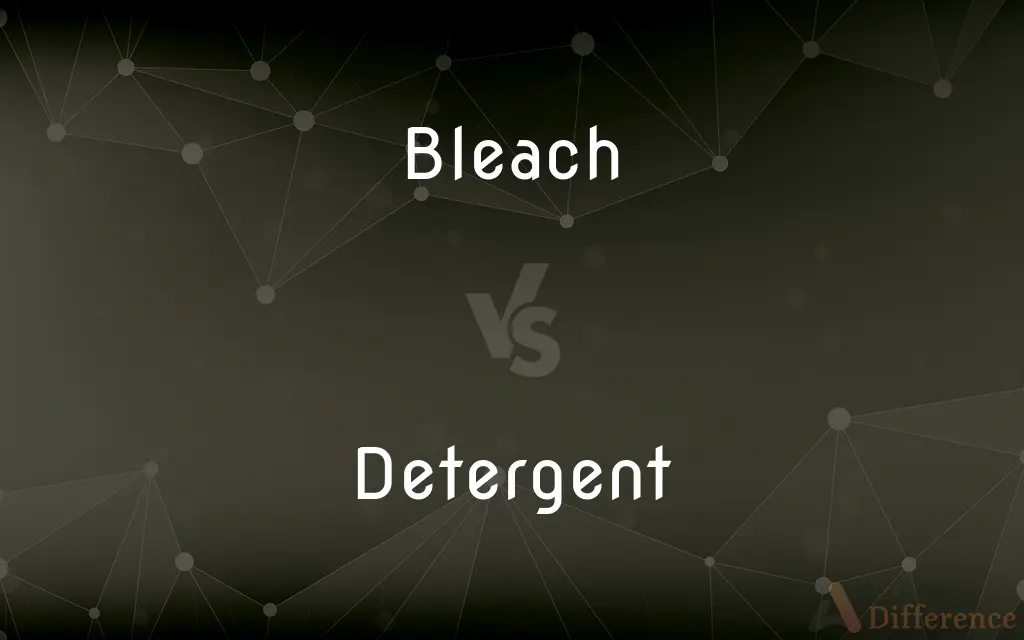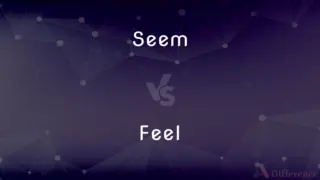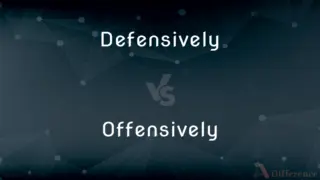Bleach vs. Detergent — What's the Difference?
Edited by Tayyaba Rehman — By Urooj Arif — Updated on May 9, 2024
Bleach is a strong chemical used for disinfection and stain removal, often whitening fabrics or surfaces, while detergent is a cleaning agent designed to remove dirt and grease from fabrics, dishes, or surfaces.

Difference Between Bleach and Detergent
Table of Contents
ADVERTISEMENT
Key Differences
Bleach is a chemical compound that disinfects and removes stains, primarily through oxidation. Detergent, on the other hand, is a surfactant-based cleaning product designed to break down grease and grime, mainly through emulsification.
Bleach typically contains sodium hypochlorite or hydrogen peroxide and is effective against bacteria, viruses, and mold. Detergent contains surfactants, enzymes, and other ingredients to lift stains and dissolve oils.
Bleach is harsh on fabrics and should be used carefully to avoid damage or discoloration. Detergent is milder and designed for routine fabric cleaning, often including fabric-safe formulas.
Bleach can be hazardous if not handled correctly, potentially causing burns or respiratory issues. Detergent, while generally safer, can still cause irritation if ingested or if it comes into contact with sensitive skin.
Bleach is used in sanitation, mold removal, and whitening applications. Detergent is more versatile, used for laundry, dishwashing, and general household cleaning.
ADVERTISEMENT
Comparison Chart
Purpose
Disinfection and stain removal
Dirt and grease removal
Chemical Base
Sodium hypochlorite or hydrogen peroxide
Surfactants, enzymes, and builders
Effectiveness
Kills bacteria, viruses, and mold
Cleans dirt, stains, and oils
Safety Concerns
Highly corrosive, needs careful handling
Mildly irritating, generally safer
Usage Scope
Sanitation and whitening
Laundry, dishwashing, and surface cleaning
Compare with Definitions
Bleach
A chemical used to remove color or disinfect.
The bleach removed the tough wine stain from the white tablecloth.
Detergent
A cleansing agent that removes dirt and grease.
The dishwasher detergent easily cut through the grease.
Bleach
To whiten or lighten in color.
She bleached her hair for a new look.
Detergent
A compound made primarily from surfactants.
Laundry detergents often contain enzymes for stain removal.
Bleach
To make less vibrant or intense.
The sun bleached the colors of the old posters.
Detergent
Any substance designed to remove impurities.
The hospital used a specialized detergent for cleaning surgical instruments.
Bleach
A powerful oxidizing agent used for cleaning.
Bleach is often used to disinfect bathrooms.
Detergent
Effective in both domestic and industrial cleaning.
The cleaning crew used a powerful detergent for the office floors.
Bleach
To remove stains from fabrics or surfaces.
The company bleaches the linens to keep them clean.
Detergent
Suitable for emulsifying oils and suspending dirt in water.
This detergent formula works well in cold water.
Bleach
Bleach is the generic name for any chemical product that is used industrially and domestically to remove color from a fabric or fiber or to clean or to remove stains in a process called bleaching. It often refers, specifically, to a dilute solution of sodium hypochlorite, also called "liquid bleach".
Detergent
A detergent is a surfactant or a mixture of surfactants with cleansing properties in dilute solutions. These substances are usually alkylbenzene sulfonates, a family of compounds that are similar to soap but are more soluble in hard water, because the polar sulfonate (of detergents) is less likely than the polar carboxylate (of soap) to bind to calcium and other ions found in hard water.
Bleach
To remove the color from, as by means of chemical agents or sunlight
Over time, the exposure to sunlight bleached the rug in front of the window.
Detergent
A water-soluble cleansing agent which combines with impurities and dirt to make them more soluble, and differs from soap in not forming a scum with the salts in hard water
Packets of detergent
Liquid detergents
Bleach
To make white or colorless
Dawn bleached the mountains.
Detergent
Relating to detergents or their action
Staining that resists detergent action
Bleach
To whiten by causing the death or expulsion of algal symbionts from (coral).
Detergent
A cleansing substance that acts similarly to soap but is made from chemical compounds rather than fats and lye.
Bleach
To act as or use a bleach.
Detergent
Having cleansing power.
Bleach
To become white as a result of the loss of algal symbionts, usually following an environmental stress such as increased water temperature. Used of coral.
Detergent
Any non-soap cleaning agent, especially a synthetic surfactant.
Bleach
A chemical agent used for bleaching.
Detergent
Syn of cleansing.
Bleach
The act of bleaching.
Detergent
Cleansing; purging.
Bleach
The degree of bleaching obtained.
Detergent
A surface-active chemical widely used in industry and laundering
Bleach
(archaic) Pale; bleak.
Detergent
A cleansing agent that differs from soap but can also emulsify oils and hold dirt in suspension
Bleach
(transitive) To treat with bleach, especially so as to whiten (fabric, paper, etc.) or lighten (hair).
Detergent
Having cleansing power
Bleach
(intransitive) To be whitened or lightened (by the sun, for example).
Bleach
To lose color due to stress-induced expulsion of symbiotic unicellular algae.
Once coral bleaching begins, corals tend to continue to bleach even if the stressor is removed.
Bleach
To make meaningless; to divest of meaning; to make empty.
Semantically bleached words that have become illocutionary particles
Bleach
(uncountable) A chemical, such as sodium hypochlorite or hydrogen peroxide, or a preparation of such a chemical, used for disinfecting or whitening.
Bleach
(countable) A variety of bleach.
Bleach
An act of bleaching; exposure to the sun.
Bleach
A disease of the skin.
Bleach
To make white, or whiter; to remove the color, or stains, from; to blanch; to whiten.
The destruction of the coloring matters attached to the bodies to be bleached is effected either by the action of the air and light, of chlorine, or of sulphurous acid.
Immortal liberty, whose look sublimeHath bleached the tyrant's cheek in every varying clime.
Bleach
To grow white or lose color; to whiten.
Bleach
The whiteness that results from removing the color from something;
A complete bleach usually requires several applications
Bleach
An agent that makes things white or colorless
Bleach
The act of whitening something by bleaching it (exposing it to sunlight or using a chemical bleaching agent)
Bleach
Remove color from;
The sun bleached the red shirt
Bleach
Make whiter or lighter;
Bleach the laundry
Common Curiosities
Does bleach damage fabrics over time?
Yes, frequent use of bleach can weaken or discolor certain fabrics.
Can detergents remove tough stains like bleach?
Some detergents, especially those with enzymes, can remove tough stains, but bleach is more effective for whitening.
Can detergents disinfect surfaces?
Most detergents clean but do not disinfect; however, some antibacterial formulas offer both cleaning and disinfection.
Is bleach harmful to the environment?
Yes, bleach can have environmental impacts if not properly diluted or disposed of.
Can you use detergent for whitening clothes?
Some detergents contain brighteners but are not as effective as bleach for pure whitening.
Can bleach and detergent be used together?
It's generally not recommended to mix them directly, as chemical reactions can occur. However, laundry detergents often work well with bleach when used according to guidelines.
Are there different types of detergents for specific uses?
Yes, there are detergents designed for laundry, dishwashing, and other cleaning tasks.
Is bleach safe to use on colored fabrics?
No, bleach often fades or damages colored fabrics unless using a "color-safe" formula.
Are there natural alternatives to bleach?
Yes, vinegar and hydrogen peroxide are commonly used as milder natural alternatives.
Is bleach always a liquid?
No, bleach is available in liquid, powder, and gel forms.
Can detergent cause allergic reactions?
Yes, some people are sensitive to fragrances or chemicals in detergents.
Is bleach effective against all types of bacteria?
Yes, bleach can kill a broad spectrum of bacteria and viruses when used correctly.
How do surfactants in detergent work?
Surfactants emulsify oils, allowing them to be washed away with water.
Does detergent affect water hardness?
Some detergents contain water softeners to improve cleaning efficiency in hard water.
What types of stains does bleach not work on?
Bleach is less effective on rust, ink, and grease stains.
Share Your Discovery

Previous Comparison
Seem vs. Feel
Next Comparison
Defensively vs. OffensivelyAuthor Spotlight
Written by
Urooj ArifUrooj is a skilled content writer at Ask Difference, known for her exceptional ability to simplify complex topics into engaging and informative content. With a passion for research and a flair for clear, concise writing, she consistently delivers articles that resonate with our diverse audience.
Edited by
Tayyaba RehmanTayyaba Rehman is a distinguished writer, currently serving as a primary contributor to askdifference.com. As a researcher in semantics and etymology, Tayyaba's passion for the complexity of languages and their distinctions has found a perfect home on the platform. Tayyaba delves into the intricacies of language, distinguishing between commonly confused words and phrases, thereby providing clarity for readers worldwide.













































